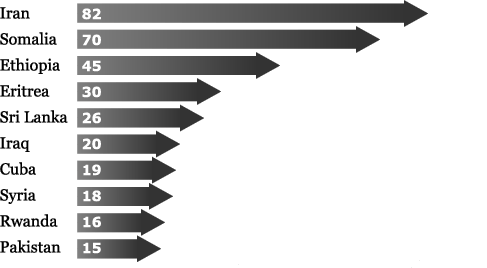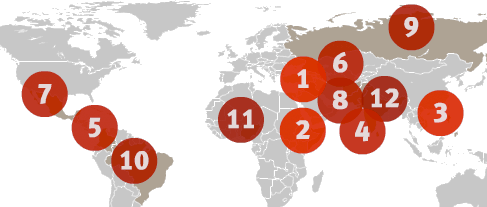Journalists and news outlets working outside government-approved news media remained under constant pressure and faced attacks even as Sri Lanka prepared to host the biennial Commonwealth Heads of Government Meeting (CHOGM) in Colombo. In the weeks leading up to the meeting, U.N. High Commissioner for Human Rights Navi Pillay slammed Sri Lanka’s rights record during a visit to the country, saying the government had become increasingly repressive toward the press and critical voices. Earlier in the year, authorities introduced a draft media code in parliament that would impose harsh restrictions on journalists’ ability to report freely. It was withdrawn after criticism. Local journalists said the code would further the self-censorship that was already pervasive. The government showed no political will to address its record of perfect impunity in nine murders of journalists during the past decade. Cartoonist and columnist Prageeth Eknelygoda remained unaccounted for after disappearing in 2010.
Sri Lanka
» Sri Lanka’s rights record overshadows Commonwealth summit.
» Critical, opposition journalists continue to face threats, severe intimidation.
Journalists and news outlets working outside government-approved news media remained under constant pressure and faced attacks even as Sri Lanka prepared to host the biennial Commonwealth Heads of Government Meeting (CHOGM) in Colombo. In the weeks leading up to the meeting, U.N. High Commissioner for Human Rights Navi Pillay slammed Sri Lanka’s rights record during a visit to the country, saying the government had become increasingly repressive toward the press and critical voices. Earlier in the year, authorities introduced a draft media code in parliament that would impose harsh restrictions on journalists’ ability to report freely. It was withdrawn after criticism. Local journalists said the code would further the self-censorship that was already pervasive. The government showed no political will to address its record of perfect impunity in nine murders of journalists during the past decade. Cartoonist and columnist Prageeth Eknelygoda remained unaccounted for after disappearing in 2010.
The biennial Commonwealth Heads of Government Meeting (CHOGM) in November was overshadowed by criticism of Sri Lanka's rights record, and President Mahinda Rajapaksa faced international condemnation.
In the days before the summit, Canadian Prime Minister Stephen Harper said he would not attend the meeting, citing Sri Lanka's abysmal rights record. He was joined by Indian Prime Minister Manmohan Singh and Mauritian Prime Minister Navin Ramgoolam.
U.K. Prime Minister David Cameron attended the summit, and also traveled to Jaffna, a mainly Tamil part of the country, where he met with local journalists and discussed press freedom concerns. Cameron told the journalists he would stress an investigation into human rights abuses when he met with Rajapaksa.
The request was rejected by Rajapaksa.
At least 26 journalists have been driven into exile from Sri Lanka in the past five years, one of the highest numbers in the world, CPJ research shows. Facing persistent threats, at least three journalists fled the country between June 1, 2012, and May 31, 2013, according to CPJ data. Few of the journalists have dared to return over the years, the research shows.

CPJ's Impunity Index, which calculates unsolved journalist murders as a percentage of each country's population, identified Sri Lanka as having one of the world's worst records in combating deadly anti-press violence. Mahinda Rajapaksa's government has failed to prosecute any perpetrators in the nine murders that have taken place during his time in power, first as prime minister and then president. All of the victims reported on politically sensitive issues.

| 1. Iraq 2. Somalia 3. Philippines | 4. Sri Lanka 5. Colombia 6. Afghanistan | 7. Mexico 8. Pakistan 9. Russia | 10. Brazil 11. Nigeria 12. India |
Prageeth Eknelygoda, an opposition cartoonist and columnist, remained unaccounted for after vanishing in January 2010. Authorities showed no evidence that they were working to solve the case, despite the tireless efforts of Eknelygoda's wife, Sandhya. Instead, the government continued to discredit Eknelygoda and his wife.
2010: | In the early days of Eknelygoda's disappearance, pro-government journalists dismiss his absence as a publicity stunt. |
2011: | Former Attorney General Mohan Peiris says at a news conference after testifying at the U.N. Committee Against Torture in Geneva that Eknelygoda has taken refuge in a foreign country and that the campaign to resolve his disappearance is a hoax. |
2013: | MP Arundika Fernando, while speaking in parliament, says Eknelygoda is alive and well. Fernando says Eknelygoda is living in France in disguise, using an alias. Several other journalists who have disappeared are there with him, Fernando says. In addition, he says, "Their wives go on staging protests, hold press conferences, and blame the government for their disappearances," while their husbands are leading the ex-pat high life. |
